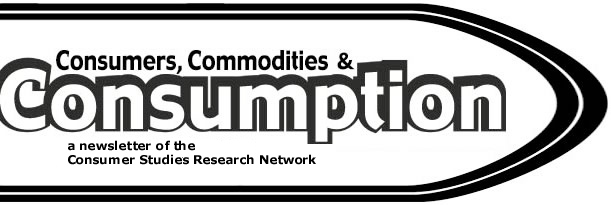 |
|
newsletter designer
Emerson University
Dan
Cook
editor
Rutgers University- Camden
George Ritzer
long-time, dedicated supporter
University of Maryland-College Park
Mike
Ryan
listserv manager
University of Maryland—College Park
Statement
of Purpose
The organizing
group for the Consumer Studies Research Network seeks to foster dialogue
and debate among those who are interested in and concerned about the
place of goods and commodities in social life. These interests and concerns
may range from the poetics of micro/personal identity formation to the
identity politics of gendered, raced and classed display, from historical
work on the rise of consumer culture to a critique of Nike advertising,
from investigations of typical places of consumption to the study the
dynamics of globalization and urban areas. Individuals affiliated with
the Consumer Studies Research Network desire to bring to the fore, in
their own ways, the depths to which commodities and a market logic have
come to pervade virtually all forms of social life and social interaction.
The primary goal is to begin to engage in an interchange.
Contact:
Dan Cook
Consumer Studies
Research Network
Rutgers University
405-7 Cooper Street
Camden, NJ 08102
phone: 856-225-2816
fax: 856-225-6435
dtcook@camden.rutgers.edu
Have something to say? Send in essays, comments, letters, reviews, observations
for the next Newsletter.
For
technical questions, please contact Monika
Deppen Wood
Paolo Magaudda
University of Padua
Paolo.magaudda@unipd.it
This short paper will consider the relationship between hacking practices and the consumer realm on two levels. The first level is conceptual and aims to connect the question of hacking practices to broader ideas which are emerging nowadays in consumer studies. The second level is empirical, and consists of a description of the practice of “jailbreaking”, which is a widespread consumer modification involving the well-known Apple digital device, the iPhone. Both levels will help in highlighting how emerging hacking practices should be considered relevant factors in the shaping of forthcoming forms of digital consumption.
 |
|
|||||
A Little Protest Music
Randal Doane
Oberlin College
randal.doane@oberlin.edu
“Spectacle,” hosted by Elvis Costello, is the best music
show on television, for it allows us members of the post-boomer generation
to wax nostalgically about the righteousness of our musical heroes with
greater accuracy. For a two-episode special this past winter, Springsteen
and Costello shared stories about musical influences, their sense of
craft, and what it means for an artist to take a stand. This special,
alas, was filmed prior to one of the most poignant stands of recent memory,
for which Springsteen was in attendance as an honoree. Last December,
at the Kennedy Center Honors of 2009, John Mellencamp drew upon the Springsteen
oeuvre to remind the well-heeled audience of the political capacity of
popular music.
The accolades
for Springsteen’s fellow honorees–Mel Brooks, Dave Brubeck, opera
singer Grace Bumbry, and Robert DeNiro–were predictably upbeat. Springsteen
headlined, of course, and Jon Stewart and Ron Kovic offered hilarious and poignant
tributes, respectively, then yielded the stage to John Mellencamp.
Under the spotlight, Mellencamp offered not even a wave to the honorees, who
shared a box with the President and the First Lady. At a reception earlier that
day, President Obama had honored these artists, noting how, “In moments
of division or doubt, they compel us to see the common values that we share;
the ideals to which we aspire, even if we sometimes fall short. In days of hardship,
they renew our hope that brighter days are still ahead.”
For the first stanza, Mellencamp offered a gravelly and guttural lament, de-familiarizing words the audience largely knew into a thinly veiled accusation. Stripped of their melodic accompaniment, the phrases “dead man’s town” and “like a dog” were clearly Springsteen-esque, but difficult to match to a particular song. After a drawn-out rest, Mellencamp abandoned the amelodic ruse, growling haltingly, “Born / in the USA.”
Mellencamp moved slowly through the second verse, as if he alone were bearing the burden of another war against “the yellowman.” The 1984 release of Born in the USA coincided with the Reagan-approved, US-sponsored terrorism against the government of Nicaragua.by Kerry McCall
Institute of Art, Design and Technology, Dublin
Kerry.McCall@iadt.ie
Having spent twenty odd years of my life attending contemporary cultural openings, exhibitions, performances and happenings, I began to wonder what the attending audience got out of the experience and what motivated them to go. This query did not stem from boredom with my cultural habits but more from the need to understand why some individuals chose to experience art forms and cultural experiences, while others did not. If it was purely entertainment, a matter of leisure preferences, or escapism from the ravages of modern life, then heading to the local cinema, music concert or the local pub might just do the same trick.
